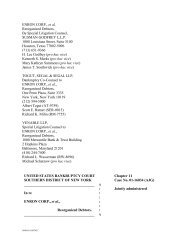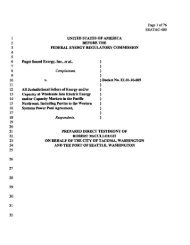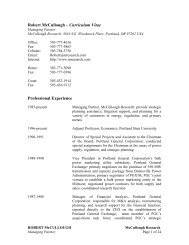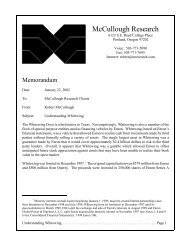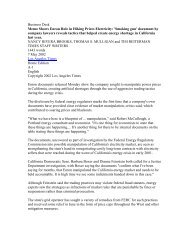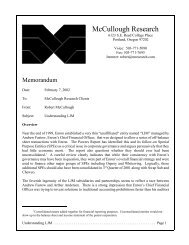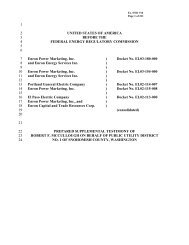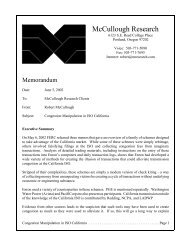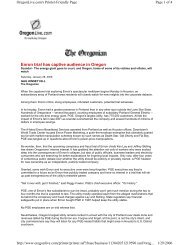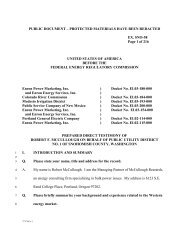Testimony of Robert McCullough before the U.S. Senate Committee ...
Testimony of Robert McCullough before the U.S. Senate Committee ...
Testimony of Robert McCullough before the U.S. Senate Committee ...
Create successful ePaper yourself
Turn your PDF publications into a flip-book with our unique Google optimized e-Paper software.
Equally dangerous was Enron’s use <strong>of</strong> mark-to-market revenue and earnings accounting. Enron<br />
apparently calculated <strong>the</strong> proceeds from multi-year transactions based on values from forward<br />
markets that are thin at best and non-existent at worst. One industry pundit called depending on<br />
forward markets in electricity as pricing by rumor. If mark-to-market is used, <strong>the</strong> assumptions<br />
behind <strong>the</strong> calculations must be open for review.<br />
Commercial Transparency<br />
Commercial transparency is also a problem. FERC’s previous chairman, Curt Hebert, recently<br />
appeared <strong>before</strong> this committee and stated that “In today's competitive markets, however,<br />
confidentiality <strong>of</strong> price and customer information can be critical to a utility's success.” One <strong>of</strong> <strong>the</strong><br />
lessons <strong>of</strong> <strong>the</strong> California market failure and Enron’s collapse is that he cannot have been more<br />
wrong.<br />
One <strong>of</strong> <strong>the</strong> ironies <strong>of</strong> <strong>the</strong> California crisis is that <strong>the</strong> <strong>the</strong>oretical pursuit <strong>of</strong> transparency through <strong>the</strong><br />
establishment <strong>of</strong> centralized markets at <strong>the</strong> California ISO and Power Exchange led to <strong>the</strong> filing <strong>of</strong><br />
a tariff at FERC that made almost all commercial information secret. The logic is that commercial<br />
data availability would make gaming <strong>the</strong> centralized markets easier and, <strong>the</strong>refore, in order to protect<br />
<strong>the</strong> competitive process, government must intervene to suppress <strong>the</strong> distribution <strong>of</strong> market data.<br />
In practice, <strong>the</strong> secrecy enforced by <strong>the</strong> ISO has made <strong>the</strong>ir markets completely opaque. Ano<strong>the</strong>r<br />
irony is that in <strong>the</strong> course <strong>of</strong> <strong>the</strong> many investigations currently under way as well as numerous FERC<br />
cases, all commercial information is now readily available to market interests. Only policy makers,<br />
<strong>the</strong> press, and consumers do not have access to market data.<br />
Restriction <strong>of</strong> market information weakened <strong>the</strong> negotiating position <strong>of</strong> consumers and made high<br />
prices far more likely in <strong>the</strong>se markets.<br />
Even today, weak reporting <strong>of</strong> marketers to FERC and restrictive information rules by ISOs make<br />
concentration and abuse in market hubs difficult to monitor. Enron, for example, doesn’t include<br />
market hub information in <strong>the</strong>ir quarterly marketing report to FERC, even though many o<strong>the</strong>r<br />
marketers do. Our only way to know <strong>the</strong> degree <strong>of</strong> market dominance Enron had achieved at certain<br />
hubs is to “reverse engineer” reports from marketers who do report such data in order to calculate<br />
Enron’s share <strong>of</strong> transactions. In doing so, we now know that Enron had achieved a share <strong>of</strong> greater<br />
than 30% <strong>of</strong> transactions at <strong>the</strong> California-Oregon Border.<br />
The relevance <strong>of</strong> such information is critical. On December 3 rd , Enron went into Chapter 11. At <strong>the</strong><br />
same time, forward markets on <strong>the</strong> West Coast fell by 30%. No o<strong>the</strong>r changes in operations,<br />
hydroelectric supply, or fossil fuel prices took place at that time. The clear implication is that Enron<br />
may have been using its market dominance to “set” forward prices.<br />
The negative impacts <strong>of</strong> <strong>the</strong>se policies are not only felt by consumers. Bonneville Power, an agency<br />
<strong>of</strong> <strong>the</strong> Energy Department, posted $337 million in losses last year – losses that reflect a cost in <strong>the</strong><br />
short term to <strong>the</strong> U.S. Treasury. One possible reason is <strong>the</strong> large degree <strong>of</strong> transactions between<br />
Enron and Bonneville during this period.





